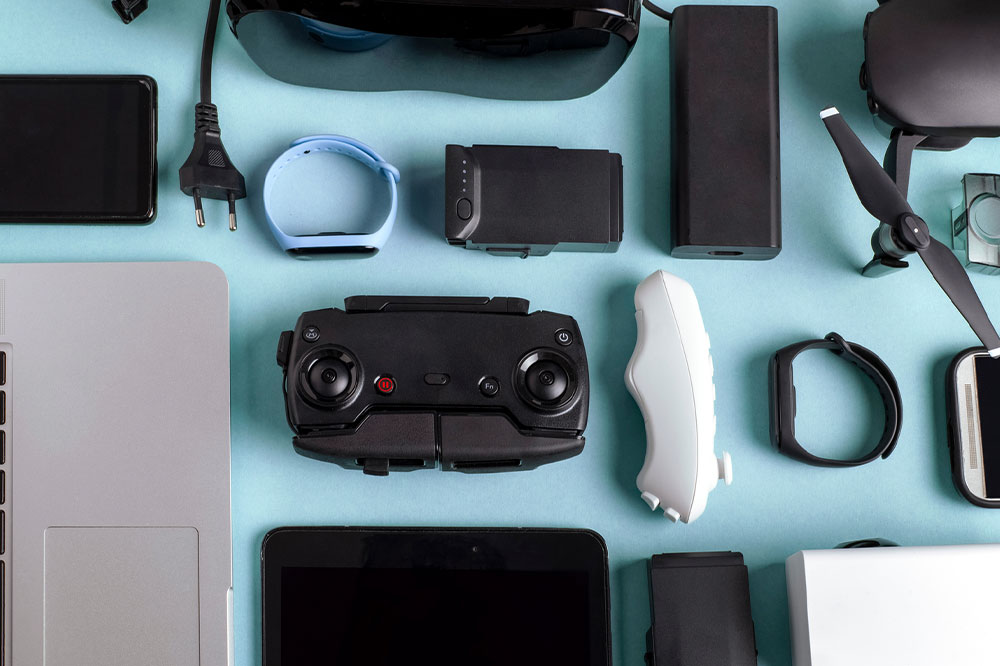
Electronics – Common types, key accessories, and career options
Electronic devices are must-have tools today, essential for carrying out daily tasks while also making work easier. Electronic devices use electrical energy to perform various functions, like playing music, communicating via text, audio, and video, and recording and process digital information. built around semiconductors and passive electrical components. The field of electronics also presents a unique opportunity for those willing to study how these devices work and can advance in the future.
Common electronics
You can find numerous consumer electronics on the market, but here are a few common ones:
Smartphones: These are portable electronic devices that can run various apps, access the internet, and make and receive phone calls.
Laptops: Portable computers, known as laptops, are used for work, study, and entertainment.
Tablets: These portable electronic gadgets are bigger than cell phones and smaller than laptops. They are used for web browsing, watching videos, and reading books on the go.
Smartwatches: These are digital wristwatches that can integrate with a smartphone to display notifications, place calls, and monitor health information.
Gaming consoles: These are specialized gadgets designed for video games. PlayStation, Xbox, and Nintendo Switch are some well-known gaming products.
Smart TVs: Smart television sets can stream video from various online services via an internet connection and do not have to rely on a cable connection.
Wireless speakers: These are audio-based electronics that generate sound by connecting wirelessly to other devices over Bluetooth or Wi-Fi. They magnify the sound produced by electronic devices like music players, laptops, and cell phones.
Digital cameras: These cameras record photos and videos using digital sensors.
Drones: A remotely piloted aircraft, a drone can be used for aerial photography, videography, and entertainment.
Fitness trackers: These are wearable electronic that keep track of physical activities and health information like heart rate, steps taken, and calories burned.
Key electronic accessories
Accessories enhance or support the performance of electronics, improving the overall experience of using such devices. Here are the best accessories to have:
Cables and cords: Ethernet cables, USB cables, HDMI cables, VGA cables, DisplayPort cables, and adapters
Cases: Covers or cases protect electronic devices like smartphones, tablets, laptops, and cameras and cover against dings, scratches, and other types of damage.
Earphones and headphones: These accessories help you make and answer phone calls, watch videos, and listen to music privately.
Portable battery packs: Also known as “power banks”, these battery packs can quickly recharge electronic devices on the road, including laptops, tablets, and smartphones.
External storage: Data such as pictures, videos, and documents are stored on external storage devices like memory cards and flash drives.
Computer accessories: Computers and other displays/screens can be controlled using accessories like keyboards and mice.
Screen protectors: Screen guards or protectors shield digital screens against nicks, chips, and other types of damage.
Stylus pens: These pens help navigate touchscreens on laptops, tablets, and smartphones.
Gaming peripherals: Virtual reality headsets, controllers, keyboards, and mice can elevate the gaming experience.
Key components
If you are trying to understand how electronics work, looking at the devices along with electronic accessories and parts can help you achieve a complete understanding. The following components make up an electronic circuit:
Capacitor: A capacitor is an electrical device with two terminals that can electrostatically store energy in an electric field. It functions as a tiny rechargeable battery that preserves energy.
Resistor: This is a passive electrical device with two terminals that inhibits the current flow. Typically, they are color-coded.
Diode: A diode is a two-terminal device that only allows electric current to move in one direction.
Relay: Relays are electromagnetic switches that can electromechanically or electronically open and close circuits.
Transistor: This device can switch or amplify electric power.
Career in electronics
Introductory or beginner’s electronics courses may focus on themes like the interaction of electrical power, energy, and the environment, fundamental electronics engineering, and understanding electronic circuits and computer structures. A BSc in electronics can help you enter businesses producing electrical products and components, apply for electronics jobs in IT organizations or banks, or continue your studies in the same or similar subjects.
Jobs in electronics
The Bureau of Labor Statistics predicts that between 2019 and 2029, the employment of electrical engineers should increase by 3%. Here, you can explore a career in the field by choosing roles like:
Electrical Engineer
Electronics technician
Computer hardware engineer
Semiconductor engineer
Embedded systems engineer
Robotics engineer
Audio engineer
Network engineer
If you are interested in becoming a part of a thriving industry, you can explore different institutes that offer degrees in electronics as well as training. You can also take up online courses to understand the basics of electronics. For engineers wishing to enhance their knowledge in a specific aspect of electronics, both basic programs and higher-level courses are available.




